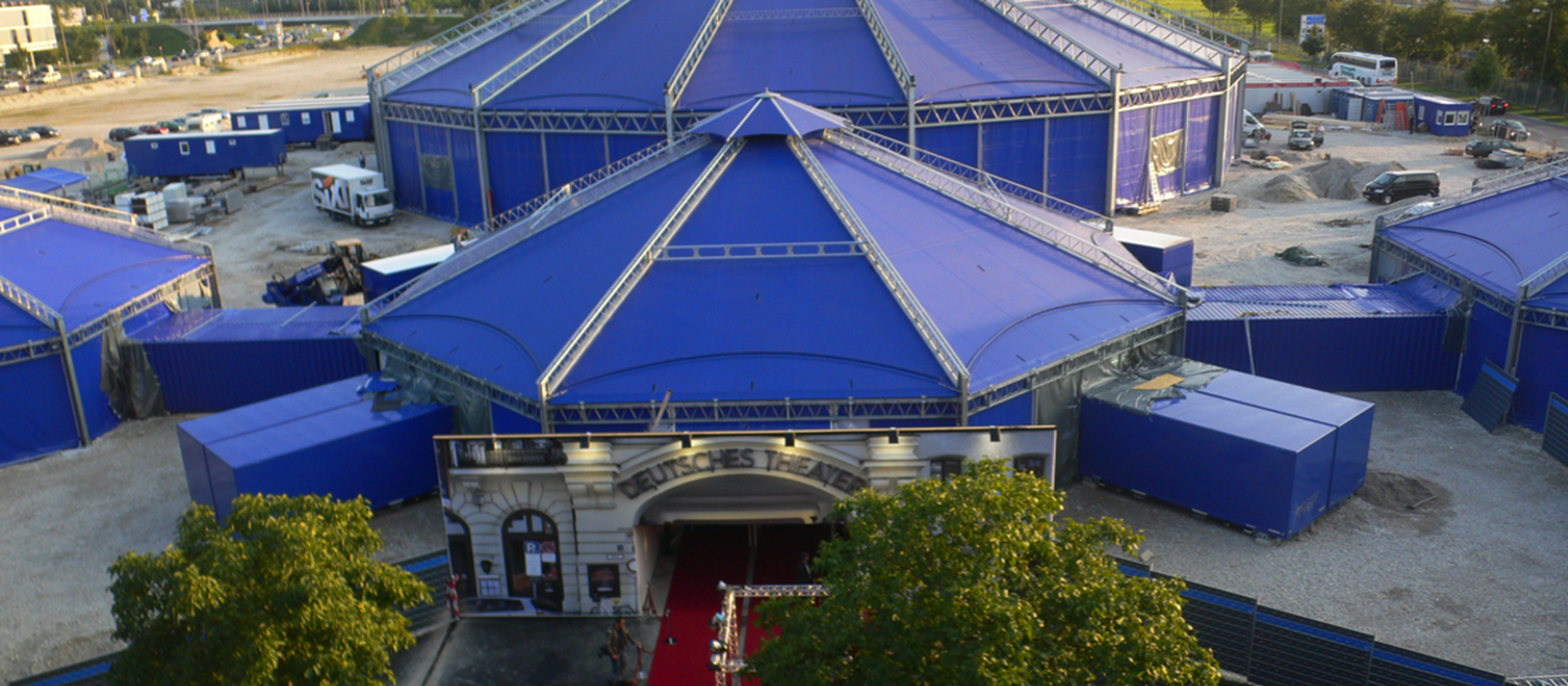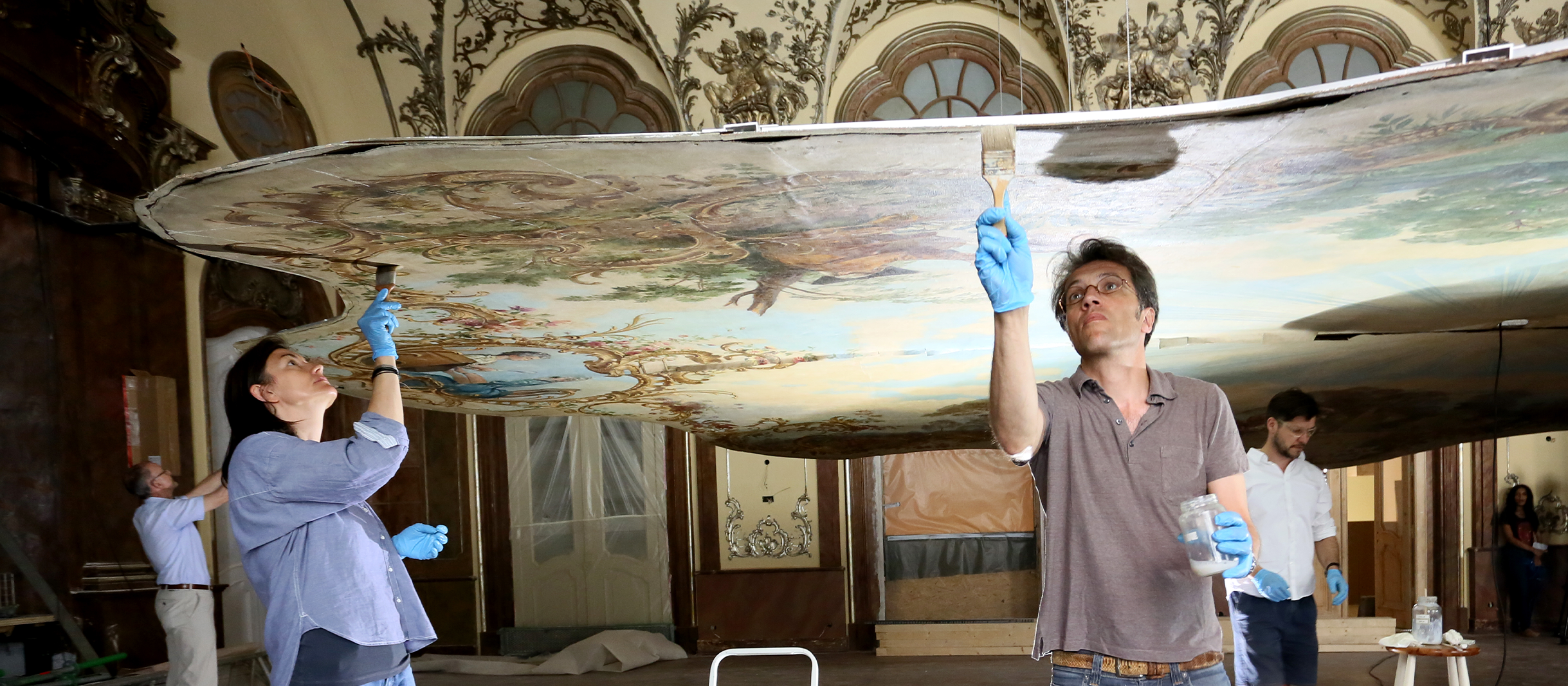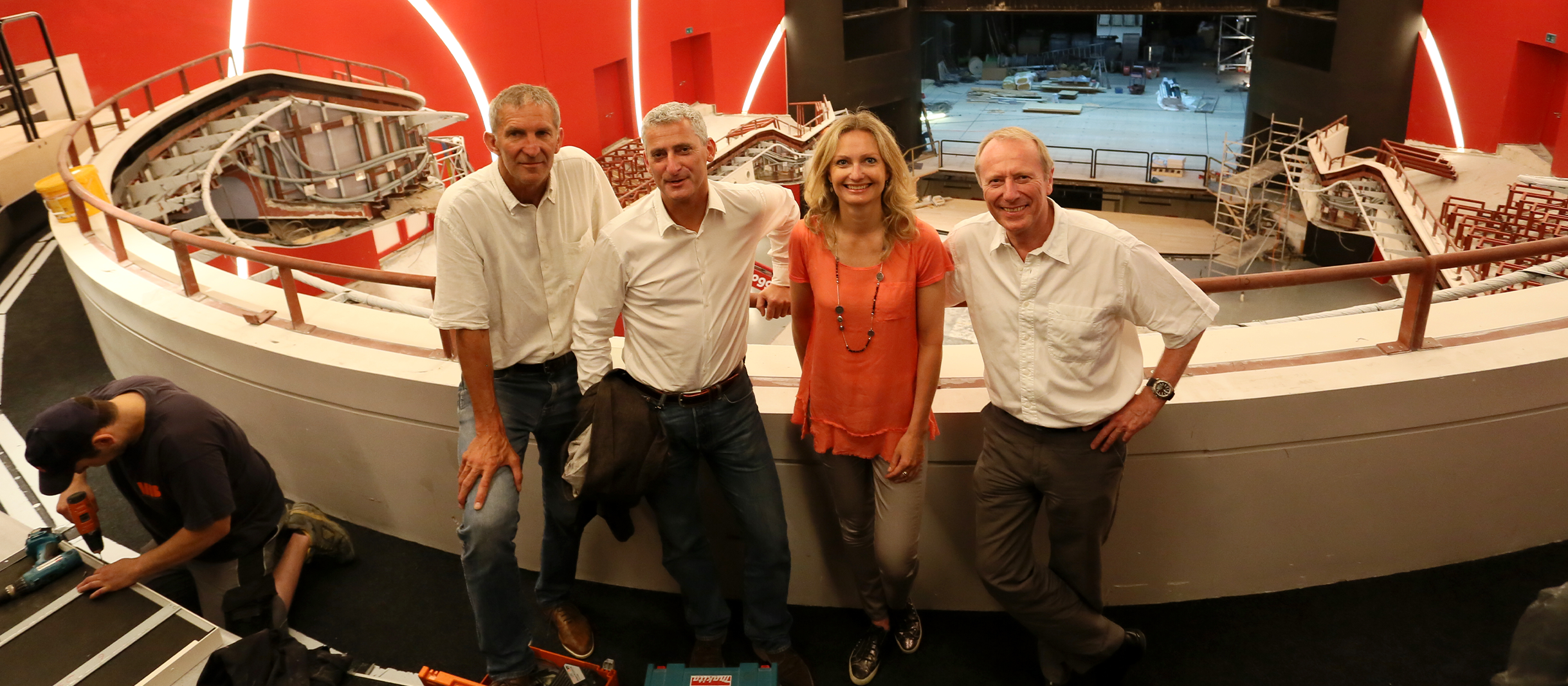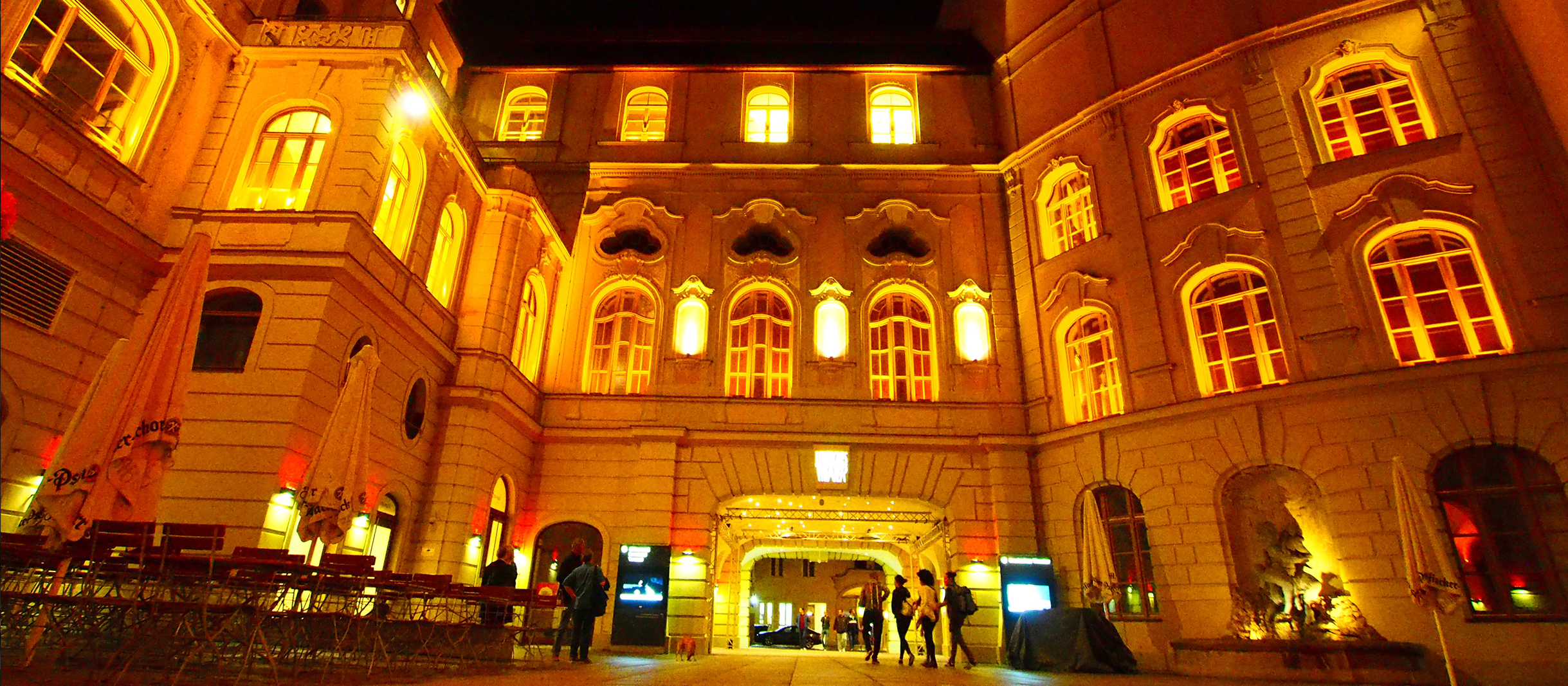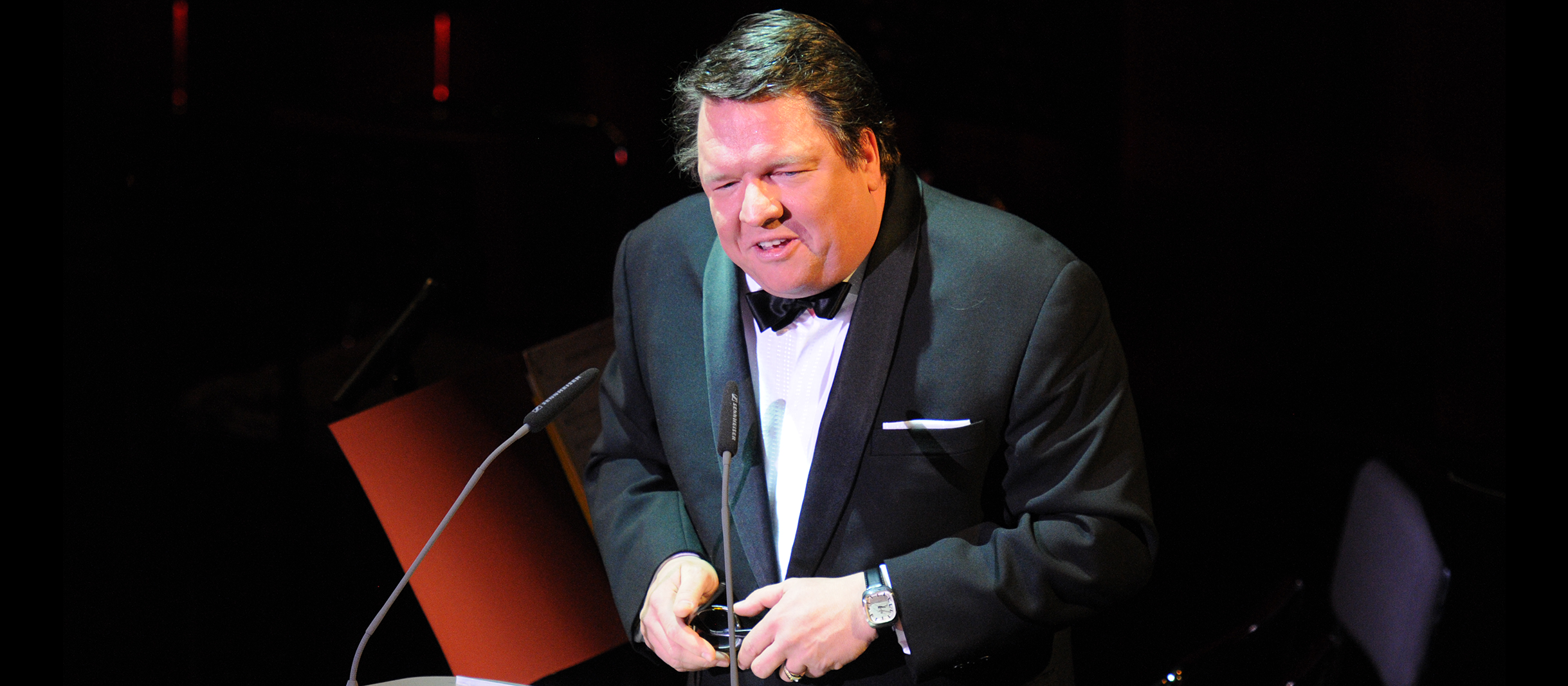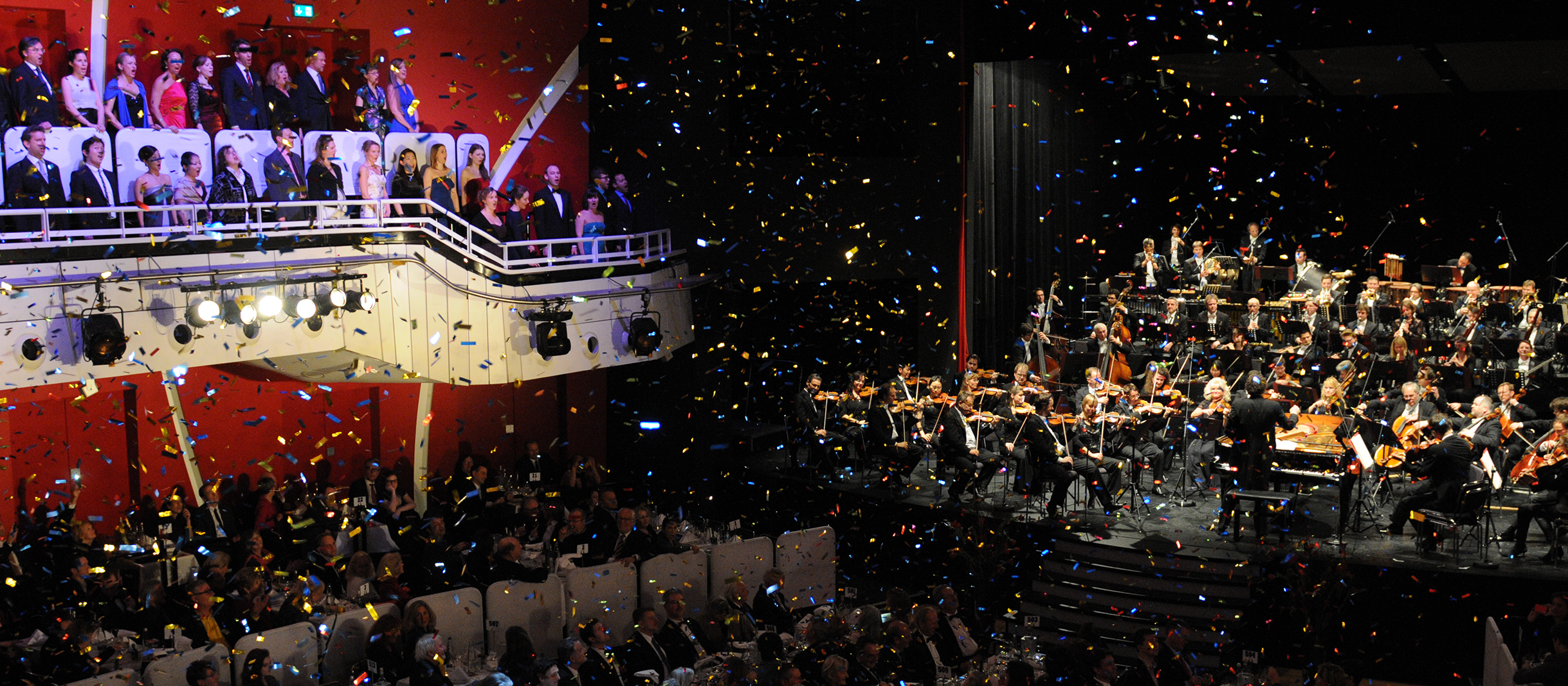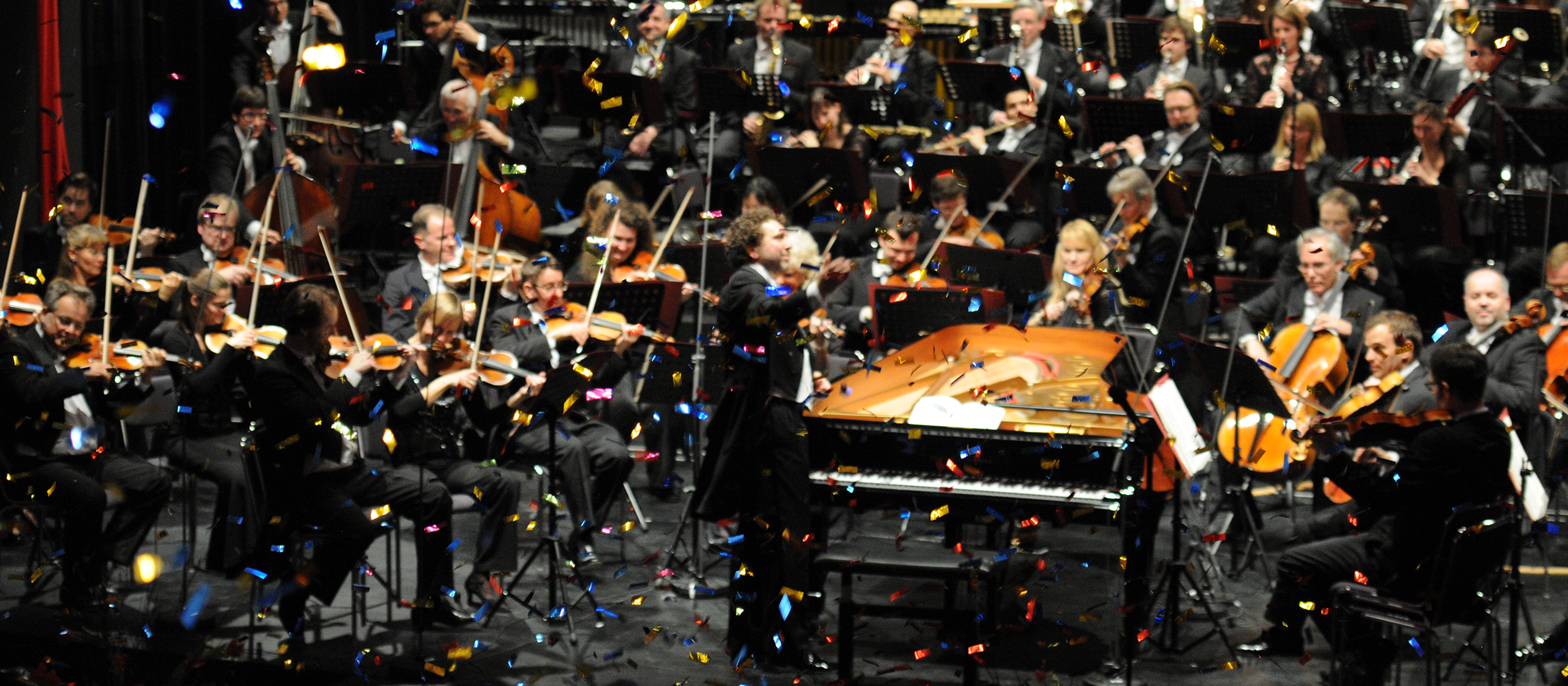History
Excursion to a Tent and a Glorious Return to the City
After only 20 years of ongoing performances in the renovated theatre, the City Council asks for a report on the state of the structural condition of the theatre. A second renovation is budgeted with € 119 million, and selling the theatre is recommended. But the public petition “Save the Deutsches Theater” with about 60.000 signatures ensures a meagre renovation instead, that guarantees the theatre to be able to play for four more years. The municipality wants to use this time to find a private investor. In October 2005, director Heiko Plapperer-Lüthgarth leaves “his” stage with a great ceremony. Andrea Friedrichs takes over to manage the house for 15 months only.
Max Raabe (“Palast Revue”, 2003, 2004 and 2007)
the revue world celebrated its radiant rebirth with Max Raabe. With evergreens such as “Mein kleiner grüner Kaktus” (My Little Green Cactus) and “Dein ist mein ganzes Herz” (Yours is My Whole Heart), the man in the tuxedo became a charming ambassador of the 1920s and a world star, who even provided musical accompaniment to the wedding of Marilyn Manson and Dita von Teese. 1986 he and friends founded the Palast Orchester, which performed chansons and songs in the style of the 1920s and 1930s. He first became known to a larger audience in 1994 when he appeared in the comedy movie “Der bewegte Mann” (The man in motion) together with the Palast Orchester. Two years later followed his first engagement as a film actor in the role of Attila in the TV movie “Charleys Tante” (Charleys Aunt). In 2003, 2004 and 2007 Max Raabe and his Palast Orchester made the Deutsches Theater swing.
The first bidding process is cancelled in 2006 as it would not have led to an economic outcome. A few months later a new tender is started throughout Europe. The municipality is looking for a tenant who would ensure the preservation of the prestigious theatre and service for at least 25 more years. The conditions: 1.500 seats and at least six fully adequate series of events per year. As it turns out, a sale would inevitably lead to a negative purchase price and thus all plans and offers are withdrawn.
On 14th February 2007, the City Council decides to maintain the theatre as a city institution. Mayor and Head of Board Hep Monatzeder states, that they are not willing to pay € 30 million to a private investor and lose the influence on the building and operation of the theatre at the same time. In 2007, Carmen Bayer and Werner Steer take over as Managing Directors after having worked for the Deutsches Theater as attorney and procurator of the company before.
This also includes still upholding performances during a the renovation, as in 2008, the City Council decides on a general renovation of the building and – in contrast to the reconstruction works in 1982 – a relocation of the stage to a tent in Fröttmaning during that time. Construction works at the Schwanthalerstraße begin in June 2008 and are supposed to be finished in November 2011.
The “new” Deutsches Theater in Fröttmaning opens its gates, although still unfinished, with hosting the farewell gala for Oliver Kahn on September 3rd 2008. Nonetheless, on October 16th, the first grand premiere takes place: In Nomine Patris celebrates its world premiere. The media response to this musical which voices criticism against the catholic church, is anything but pleasing. “The tent is nice. And that is as positive as it gets that night” is the review of the Süddeutsche Zeitung. As the location in Fröttmaning has already been eyed critically anyways, the negative reviews do not soften the start there. Nevertheless, subsequent productions like My Fair Lady, Swan Lake and The Rocky Horror Show manage to attract audiences to come to Fröttmaning. Sold out performances prove that the programme and the temporary venue in the north of Munich are appealing.
Senta Berger („Happy Birthday Senta Berger – „Wiener Melange“ at the Deutsches Theater“, 2011)
Fascinating – this expression fittingly describes Senta Berger in several ways. Her filmography, which requires several pages to be displayed in its entirety, can certainly be called fascinating, as can the prices the Austrian actress was awarded with. But she also fascinates her audience every time she enters the stage for a reading or as a singer. For her 70th birthday she turns the Deutsches Theater into a Viennese temple of the Muses: “When she pauses for an instance, you could hear the birds sing within the silence (…). It was probably Senta Berger’s voice that allured them.” (Süddeutsche Zeitung).
In June 2009, it becomes obvious that the renovation is likely to be delayed when cracks are discovered in the underground tunnels that run under the theatre in the Schwanthalerstraße. Further problems cause several delays of the reopening. The tent closes its doors with the derniere of Anything goes on March 22nd 2013. Over the course of time more than one million guests have visited the tent during the time in Fröttmaning. The scheduled relocation of operations is set for June 17th, the reopening is planned for a then still unknown date in autumn/winter 2013/2014.
On January 17th 2014, the red carpet is finally rolled out in Munich’s heart of premium entertainment. Together with Mayor Christian Ude, the supervisory board and its head of board Hep Monatzeder and Secretary of Cultural Affairs Dr. Hans-Georg Küppers, the directors of the theatre Carmen Bayer and Werner Steer reopen the historic stage. “I am glad that a tradition of Munich could be preserved” Mr Ude says in his speech. “The Deutsches Theater has finally become the ‘palace of smile’ again”.
In addtion to Christian Ude, Hep Monatzeder, Carmen Bayer, Werner Steer and the new restaurant owner Lorenz Stiftl, the host of the evening Marion Rüb welcomes another surprise laudatory speaker on stage. “Originally we expected the Bavarian prime minister Horst Seehofer to join us tonight” Mrs Rüb says. However, he ist apparently tied up with the Bavarian Film Award ceremony that takes place at the same evening. Nevertheless the Deutsches Theater was able to recruit a worthy compensation, the “eternal Father of the Nation” Franz-Josef Strauß. Cabaret artist Helmut Schleich then amazed the crowd with his iconic role. Munich, in a political sense, may be a “red spot” according to Mr Strauß. “But as Erich Kiesl, who was installed as a mock-up mayor by me, totally screwed up his speech at the last reopening 30 years ago and Loriot had to save the day, I decided to attend in person this time”
But he is by no means the only celebrity to accept the invitation. Numerous representatives from politics, business and entertainment celebrate the reopening of the Deutsches Theater. Amongst them is also the German musical star Patrick Stanke who impressively demonstrates the new breathtaking acoustics. This aspect comes into effect even more when the Münchner Philharmoniker present musical compositions by Leonard Bernstein and George Gershwin that were specifically compiled for this festive evening by the excellent orchestra under the direction of Asher Fisch.
Grand emotions and goosebumps are especially evoked during the encore. “Land of Hope and Glory” by Edward Elgar is adjusted with a more suitable text: “Our Deutsches Theater, Munich’s mega star. Finally reopened, that is remarkable. Munich’s vastest ballroom proposes an invitation. No need to ‚camp‘ anymore, what could possibly be nicer!”. At the end of the evening, the guests honoured a memorable evening at the Deutsches Theater with standing ovations in a shower of confetti pouring down from the ceiling.
Numerous visitors since the reopening speak for themselves and impressively show how much people in the heart of the city have missed the Deutsches Theater. More than 300,000 visitors came to the theatre every year since 2014, and in 2016 it celebrated its 120th birthday. Among other things, with a large courtyard party and a public rehearsal of the musical “Dance of the Vampires.” In the same year, Carmen Bayer and Werner Steer were confirmed by the Munich City Council as managing directors until 2021.
Bonnie Tyler (“40 Years It’s A Heartache Tour,” 2018)
For more than 40 years, Bonnie Tyler has thrilled fans with her distinctive smokey voice, produced 16 albums, about 80 singles and sold more than 100 million records. Bonnie Tyler is internationally the “First Lady of Rock Music”. During her “40 Years It’s A Heartache Tour”, the rock star of the 80s was a live guest on our stage with her band with all her world successes, including such well-known numbers as “Lost In France“, “It’s A Heartache”, “Total Eclipse Of The Heart” and “Holding Out For A Hero” from the soundtrack “Footloose”.
In the years that followed, the number of visitors per year rose to over 350,000, until the Corona crisis in March 2020 put an abrupt end to the Schwanthalerstrasse venue. The planned celebration of the 125th anniversary in September 2021 also fell victim to this. With the Munich premiere of the musical Der Schuh des Manitu (The Manitou’s Shoe), based on the blockbuster movie of the same name by Michael “Bully” Herbig, the musical curtain finally rose again at the Deutsches Theater on October 14 after months of standstill. In the course of the coming weeks and months, however, the theater continued to struggle with difficulties such as interruptions in the performance schedule due to the Corona pandemic and restrictions on visitor capacity to 25%. Even the planned ball season in early 2022, which had already been shortened to two weeks, ultimately had to be cancelled entirely. On February 1, 2022, Thomas Linsmayer was appointed by the supervisory board as acting Managing Director of the theater and successor to Carmen Bayer and Werner Steer. Six months later, Thomas Linsmayer was confirmed as Managing Director for a further five years.


